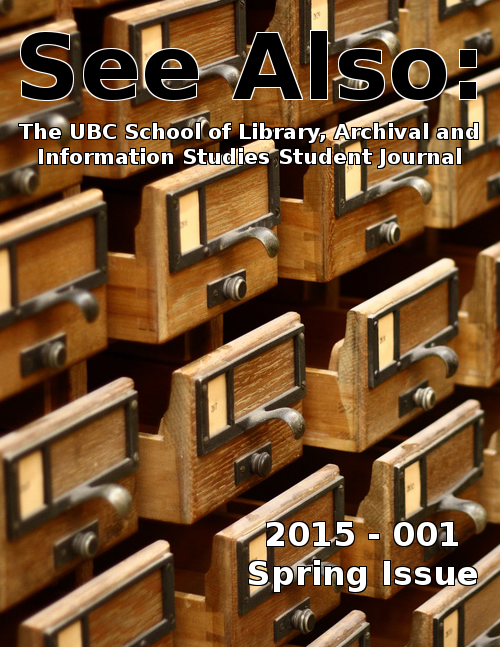Data literacy instruction in academic libraries: best practices for librarians
DOI:
https://doi.org/10.14288/sa.v1i1.186335Keywords:
academic libraries, data literacy, information literacy, data information literacy, library instructionAbstract
This paper discusses the challenges and opportunities of bringing data literacy instruction to academic libraries. Information literacy and digital literacy in libraries has been widely discussed in the library sciences and education literature, but until recently very little focus has been given to data literacy. However, new e-government and open data initiatives over the past decade have created widely available public data that is of great interest to students and academics. Increased technological capabilities to process "big data" have also created new opportunities for the layperson and researcher alike. One popular article claims, "Ensuring that big data creates big value calls for a reskilling effort that is at least as much about fostering a data-driven mindset and analytical culture as it is about adopting new technology" (Harris, 2012). The influx of available data presents unique challenges for librarians. How can libraries play a role, for example, in this “reskilling effort” to develop a “data-driven mindset”?
References
ACRL Information Literacy Best Practices Committee. (2012). Characteristics of programs of information literacy that illustrate best practices: A guideline Approved by the ACRL Board of Directors, June 2003, revised January 2012. College & Research Libraries News, 73(6), 355-359.
Association of College and Research Libraries (2000). Information literacy competency standards for higher education. Chicago: American Library Association. Retrieved from http://www.ala.org/acrl/standards/informationliteracycompetency.
Calzada Prado, J., & Marzal, M. Á. (2013). Incorporating data literacy into information literacy programs: Core competencies and contents. Libri: International Journal of Libraries & Information Services,63(2), 123-134.
Carlson, J., Fosmire, M., Miller, C. C., & Nelson, M. S. (2011). Determining data information literacy needs: A study of students and research faculty. Portal: Libraries and the Academy, 11(2), 629-657.
D'ignazio, J., & Qin, J. (2010). The central role of metadata in a science data literacy course. Journal of Library Metadata, 10(2), 188-204.
Friedlander, A., & Adler, P. (2006). To Stand the Test of Time: Long-Term Stewardship of Digital Data Sets in Science and Engineering. A Report to the National Science Foundation from the ARL Workshop on New Collaborative Relationships--The Role of Academic Libraries in the Digital Data Universe (Arlington, Virginia, September 26-27, 2006). Association of Research Libraries.
Gunter, G. A. (2007). Building student data literacy: An essential critical-thinking skill for the 21st century. MultiMedia & Internet@Schools [H.W.Wilson - EDUC], 14(3), 24.
Harris, J. (2012). Data is Useless Without the Skills to Analyze It. Harvard Business Review. Retrieved from https://hbr.org/2012/09/data-is-useless-without-the-skills.
Hogenboom, K., Phillips, C. M. H., & Hensley, M. (2011, March). Show me the data! Partnering with instructors to teach data literacy. In Declaration of Interdependence: The Proceedings of the ACRL 2011 Conference, March (pp. 410-417).
Hunt, K. (2004, April). The challenges of integrating data literacy into the curriculum in an undergraduate institution. Paper presented at Iassist conference, Madison, WI. Retrieved from http://www.iassistdata.org/downloads/iqvol282_3hunt.pdf.
Julien, H., & Boon, S. (2004). Assessing instructional outcomes in Canadian academic libraries. Library and Information Science Research, 26(2), 121.
Mandinach, E., & Gummer, E. (2012). Navigating the landscape of data literacy: It IS complex. (White Paper). WestEd. Retrieved from http://www.wested.org/online_pubs/resource1304.pdf
Merrill, A. (2011). Library+. Public Services Quarterly, 7(3-4), 144-148.
Miller, C., & Fosmire, M. (2008). Creating a culture of data integration and interoperability: Librarians collaborate on a geoinformatics course. In Proceedings of the 29th Annual IATUL Conference.
Qin, J., & D'Ignazio, J. (2010, June 22). Lessons learned from a two-year experience in science data literacy education. Paper presented at International Association of Scientific and Technological University Libraries, 31st Annual Conference. Accessed from http://docs.lib.purdue.edu/iatul2010/conf/day2/5.
Stephenson, E., & Caravello, S. P. (2007). Incorporating data literacy into undergraduate information literacy programs in the social sciences. Reference Services Review, 35(4), 525-540.
Published
Issue
Section
License
All authors in See Also retrain full copyright of their material.
All content in See Also is published under an Attribution-NonCommercial-NoDerivatives 4.0 license.
Under this license you are free to:
Share — copy and redistribute the material in any medium or format
Under the following terms:
Attribution — You must give appropriate credit, provide a link to the license, and indicate if changes were made. You may do so in any reasonable manner, but not in any way that suggests the licensor endorses you or your use.
NonCommercial — You may not use the material for commercial purposes.
NoDerivatives — If you remix, transform, or build upon the material, you may not distribute the modified material.
- No additional restrictions — You may not apply legal terms or technological measures that legally restrict others from doing anything the license permits.

